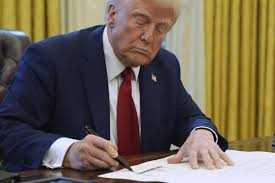
Zim Now Writer
The United States and Mexico have reached an agreement to delay the implementation of new tariffs for one month after Mexico agreed to deploy 10,000 National Guard members to its northern border to curb the flow of illegal drugs.
Mexican President Claudia Sheinbaum announced that the deal also includes a U.S. commitment to prevent the trafficking of high-powered weapons into Mexico.
The agreement was finalized during a phone call between Sheinbaum and U.S. President Donald Trump on Monday, just hours before the tariffs on Mexico, China, and Canada were scheduled to take effect.
President Trump expressed optimism about the negotiations, stating on Truth Social, "I look forward to participating in negotiations with President Sheinbaum as we attempt to achieve a deal between our two countries."
Sheinbaum also acknowledged the importance of the one-month suspension, emphasizing the need for both countries to work together and find the best way forward during this period.
The announcement provided some relief to financial markets, which had reacted negatively to fears of an escalating trade war. U.S. stocks, which had experienced sharp declines earlier in the day, began to recover following news of the agreement. The S&P 500 reduced its losses to 0.6% by midday, and Mexico’s peso also stabilized after an initial slump.
However, the situation remains tense for Canada and China, which were not granted similar tariff suspensions. Trump confirmed he had spoken with Canadian Prime Minister Justin Trudeau and planned another call later in the day. Despite ongoing discussions, Canadian officials remain pessimistic about the possibility of avoiding the tariffs, and Canada has already announced plans for retaliatory measures.
Meanwhile, Trump hinted at the possibility of imposing tariffs on the European Union, criticizing the bloc’s trade practices. In response, EU leaders meeting in Brussels expressed their readiness to retaliate if necessary but emphasized the importance of negotiation. German Chancellor Olaf Scholz stated that while Europe could respond with its own tariffs, it would be preferable to reach an agreement through dialogue.
Related Stories
Economists have raised concerns about the potential impact of the proposed tariffs, which include 25% duties on Canadian and Mexican goods and 10% on Chinese imports.
Experts warn that such measures could slow global economic growth and lead to higher prices for American consumers. The International Chamber of Commerce estimates that Mexico’s GDP could shrink by 4% due to reduced exports, while Canada could experience a 2.6% decline in economic output.
Financial markets around the world reflected these concerns. Major stock indices in Germany, France, and the United Kingdom fell sharply, while the Canadian dollar, Mexican peso, and Chinese yuan weakened against the U.S. dollar. Commodity markets were also affected, with U.S. crude oil prices rising by over 1% and gasoline futures increasing nearly 3%.
While the U.S. has not specified the exact conditions Canada or China must meet to avoid the tariffs, both countries have vowed to respond. Canada plans to challenge the tariffs through legal channels under international trade agreements, while China intends to bring the case before the World Trade Organization.
Despite these actions, both countries have left the door open for further negotiations.
President Trump defended the tariffs as necessary to address what he described as a national emergency related to illegal immigration and the trafficking of fentanyl, a deadly opioid.
However, critics argue that the tariffs could trigger stagflation—a combination of high inflation, stagnant economic growth, and rising unemployment—both in the U.S. and globally.
The automotive industry, in particular, is expected to suffer significant disruptions. The proposed tariffs would affect vehicles and parts manufactured in Canada and Mexico, straining a complex supply chain where components frequently cross borders before final assembly.
Shares of major automakers, including Ford, General Motors, Volkswagen, BMW, and Porsche, fell sharply in response to the tariff news.




















Leave Comments